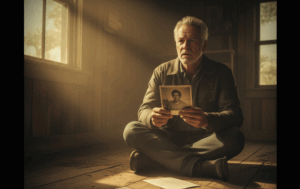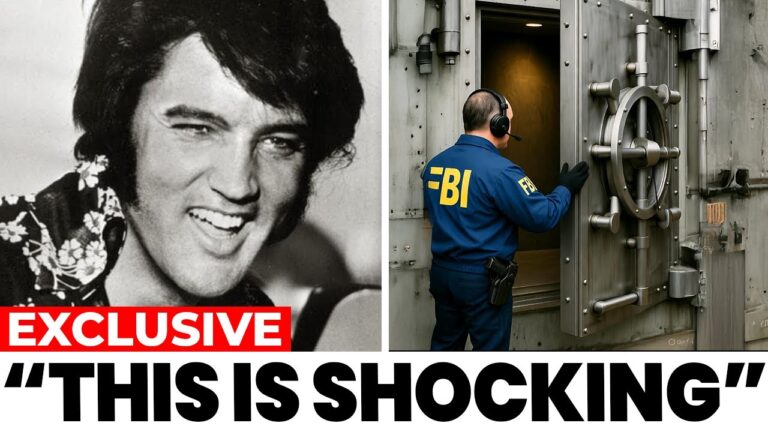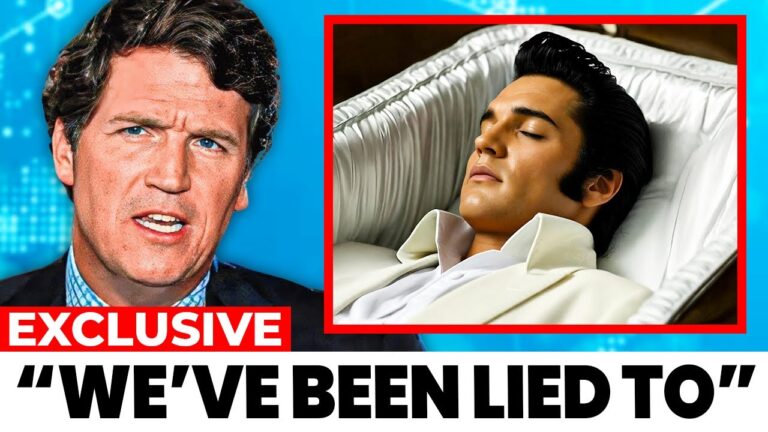The desert stretched endlessly under a bleeding Arizona sunset, where the road shimmered like a black ribbon of heat. Hank Lawson, fifty-five, rode his old Harley along Route 66 — alone, as always. His leather jacket was sun-cracked, his hair silver at the edges, his eyes hidden behind smoke-tinted glasses that had seen too many miles and too few smiles. In the inner pocket of that jacket, he carried a bundle of envelopes, tied with a shoelace. Each letter was addressed to someone different — a mother, a friend, a woman named Claire. None of them were his. They belonged to a man who no longer existed. Three months earlier, Hank had stopped at a roadside diner, just in time to see a motorcycle veer off the highway and crash into the rocks. The rider — a young man named Dylan — lay dying under a bleeding sky, gasping for air. Hank had knelt beside him, pressing his jacket against the wound, trying to stop the inevitable. Dylan had coughed, blood trickling down his chin, and whispered, “If you’re still alive tomorrow… please, deliver these.” He pressed a bundle of letters into Hank’s hand, then exhaled his last breath before the sirens ever came. Hank buried the boy by the roadside, under a cross of two sticks and a nameplate scratched with a knife: Dylan, 1998–2024. He could’ve left it there. But the next morning, he found himself still holding the letters. He didn’t know why, but he packed his bike and started riding east. Maybe out of guilt. Maybe because he had nowhere else left to go.

The first letter led him to a trailer park outside Albuquerque. A frail woman opened the door — gray hair, trembling hands. “Mrs. Hart?” Hank asked. She nodded. “Dylan wanted you to have this.” She froze when she saw the handwriting. Her lips quivered. “He… he remembered me?” “Every day, ma’am,” Hank said softly, though he didn’t know if it was true. She opened the envelope, tears falling before she finished the first line. “Tell him,” she whispered through sobs, “tell him I forgave him long ago.” Hank didn’t have the heart to say he couldn’t.
The second letter took him to a bar in Amarillo — dim lights, jukebox humming an old blues song. Behind the counter stood a man with one arm. “You knew Dylan?” he asked warily. “He wanted you to have this,” Hank said, sliding the envelope across the bar. The man stared at it for a long time, then laughed bitterly. “He finally remembered I had his back until he left me to lose mine.” Hank said nothing. The man tore the letter open, read for a while, then quietly set his whiskey down. “Son of a bitch knew how to say sorry,” he muttered, eyes wet. “You want a drink?” “Not tonight,” Hank said, standing. “I’m still driving.”
The third letter was the hardest — addressed to Claire Whitman. Hank found her in a small town near Tulsa, running a flower shop painted pale blue. When he told her who he was and why he’d come, she went silent. Her eyes filled before he even handed over the envelope. “He never came back,” she whispered. “But I kept the house key. I don’t know why.” Hank stayed by the door as she opened it, reading in silence. After a long pause, she looked at him. “Did he suffer?” “No,” Hank lied. “He went quiet.” She smiled faintly. “That’s funny. Dylan never did anything quietly.”
By then, the letters were almost gone. Only one remained — the last one, marked in slanted handwriting: To Dad. No return address. No hint of where to go. Hank turned the envelope over and over for days, riding through wind and dust and silence, as if the road itself would whisper an answer. Then one morning, near Flagstaff, he stopped at a gas station and saw an old postcard pinned on the board. It showed a faded ranch, Lawson Farm, near Kingman, Arizona. His own name. His own past.
He followed the cracked road until he reached the remains of a farm he’d left behind thirty years ago — before the army, before the drinking, before the endless rides that had replaced family and forgiveness. The wooden fence had fallen. The house sagged in on itself. Inside, the dust danced in streaks of light. On the mantel was a photo — a woman holding a baby on a Harley. On the back, faded ink read: Claire & Dylan, 2000.
Hank’s knees gave out. He sat on the cold floor, the wind howling through broken glass. Dylan hadn’t been just some stranger. Dylan had been his son — the boy he’d never met, the one he left before he was born. The realization hit like a crash. Every mile, every letter, every tear he’d delivered — it wasn’t just Dylan’s story. It was his own, looping back to him after all these years.
He pulled out the last envelope. His hands shook as he tore it open. Inside was a single page, written in messy, hurried script:
“Dad, I don’t hate you. Mom told me once that you rode off to find peace. I hope you did. I spent years trying to understand that kind of silence. I think I get it now. I’m not mad anymore. If you ever see this, I just want you to know — I’m not running away anymore. I’m going home.”
The letter dropped from Hank’s hand. The wind caught it, lifted it off the floor, and sent it fluttering out the door into the sunset — the same road Dylan had once taken. Hank walked outside, staring into the light, the desert glowing gold and red. The bundle of empty envelopes lay in his palm, tied tight with the old shoelace. For the first time in decades, he reached into his jacket, pulled out a crumpled notepad, and began to write:
“Son, I never earned the right to be your father. I ran because I was scared — of failing, of loving, of staying. But you found me anyway. You delivered your letter. Now it’s my turn.”
He folded the note, tucked it inside one of the blank envelopes, and placed it on the ground by the fence post — under the cross of two sticks where another name already rested. Then he mounted his Harley, the engine rumbling low.
As he rode off down Route 66, the wind tore at his jacket, but his heart felt lighter. He didn’t know where he was heading, but for once, it didn’t matter. Somewhere between the silence of the desert and the roar of the engine, he’d finally delivered the last letter — the one that was meant for him all along.
And behind him, under the dying sun, the envelope stirred in the dust — the ink smudging, the word Dad fading softly into the road.





